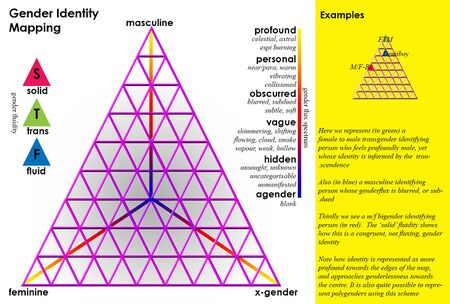Gender spectrum
| |
This article lacks significant content. You can help the Nonbinary wiki by completing it! Note to editors: remember to always support the information you proved with external references! |
Gender spectrum or gender continuum[1][2] is a term often used as a metaphor to help explain nonbinary identities.
In its most simplistic form, the gender spectrum is a line going from male on one end to female on the other end. However, this does not fully adequately include all genders; many nonbinary genders are not "between male and female" (for example maverique, agender, or
The phrase "on the gender spectrum" is sometimes used as a synonym for "nonbinary" or "gender nonconforming".[3][4]
Gender Spectrum is also the name of a USA-based gender inclusion organization.
History
The phrase "gender spectrum" dates back at least to the 1980s. For example, in a 1985 issue of the crossdressing/transsexualism magazine "Tapestry", a listing for a therapy group is described as including "transsexuals, transvestites and persons who are trying to find themselves on the gender spectrum."[5]
References
- ↑ Keig, by Zander (27 September 2012). "Gender Continuum". Campus Pride. Retrieved 8 October 2020.
because now I feel able to express myself, along the gender continuum, without reservation
- ↑ Cabaj, Robert Paul. "Working with LGBTQ Patients". psychiatry.org. Retrieved 8 October 2020.
The gender continuum breaks down into separate, but not mutually exclusive masculine and feminine continuums.
- ↑ "Sexuality and Gender: Locked in, and Out". Women and Prison. 2020. p. 90.
While prisoners who identify on the gender spectrum overwhelmingly say that their gender is not affirmed how they would identify, there are some that note being on the gender spectrum is easier than being transgender.
- ↑ Ehrensaft, Diane (2016). The Gender Creative Child. p. 106.
...the jury is still out as to exactly why we are seeing this high incidence of children on the autism spectrum showing up also as children on the gender spectrum...
- ↑ "Tapestry Issue 46 (1985)." Periodical. Digital Transgender Archive, https://www.digitaltransgenderarchive.net/files/6682x4006 (accessed October 02, 2020).

